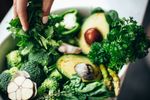Learn why you need to outsmart sugar's sweet seduction — and how to do it successfully.
Sweet treats are hard to resist, but a lack of willpower isn’t always to blame when we reach for that morning donut or after-dinner ice cream. Consuming sugar releases dopamine and stimulates the pleasure centers of our brains — and the more we eat, the more we crave. The result? Sugar addiction.
The truth is, most of us are eating way more sugar than we think we are because it hides in foods we may not even consider sweet. So in order to curb our sugar consumption, we first need to learn how to spot it on a food label. But we also need to reframe our emotional relationship with sweet things.
“Sugar has a reputation for being innocuous because we associate it with celebrations, like birthday parties and graduations — as well as a reward for a job well done,” says Michele Promaulayko, THE WELL Editorial Director and author of Sugar Free 3: The Simple 3-Week Plan for More Energy, Better Sleep & Surprisingly Easy Weight Loss!
Why is sugar bad for you?
Despite its happiness halo, sugar is more evil than good. It can be very destructive to the body, impacting everything from brain cognition to skin health to gut health, sleep patterns and more.
“When it comes to our blood sugar (glucose) level, we only need about two teaspoons to manage our equilibrium and keep everything going,” says Health Coach Pilin Anice. “Anything over that is harmful... what your body doesn’t use as energy gets stored as fat.” And it’s not just weight gain we have to fear. “Sugar affects us systemically,” says Promaulayko. “It can fuel inflammation (the precursor to most diseases), fatigue and mood disorders,” adds Anice.
"You’d never intentionally pour sugar all over your salad, but you do it unknowingly."
But there's a reason we like it so much — sugar causes a surge of dopamine, affecting the pleasure center in the brain. Every time you eat a sweet, it reinforces the neural pathways in the brain that make you feel good, creating sugar dependence (a.k.a. sugar addiction). “Consuming fuels a vicious cycle — the more we eat the more we want to eat,” says Promaulayko. Consider this unsettling example: Research on rats revealed that Oreo cookies activated more neurons in the rats’ pleasure centers of their brains than cocaine did.
Where Sugar Hides
Naturally occurring sugars (the good kind of sugar) are found in foods such as fruit and milk — and have a lot of vitamins, minerals, fiber and antioxidants. Added sugars (the stuff you want to avoid) are typically refined sugars and sugar substitutes that are put into food to make them more palatable, explains Promaulayko. Added sugars aren’t providing any nutritional value — they are just empty calories.
“We tend to assume sugar is only found in sweet-tasting foods,” says Promaulayko. “But often there are added sugars in savory products as well — things like tomato sauce, bread and salad dressings. You’d never intentionally pour sugar all over your salad, but you do it unknowingly.” One way we get tricked into eating more sugar than we intend? “There are over 70 aliases for sugar,” warns Promaulayko. “But if you familiarize yourself with the ones that are the most common you can become an expert at reading nutrition labels. It’s important to be able to spot them in order to avoid them.”
RELATED: How to Decode Nutrition Labels
How to Outsmart the Allure
The best way to begin eliminating sugar from your diet is to educate yourself on ingredients. When shopping, ignore all the marketing on the front of the package because those labels and buzzwords are there to make us buy those foods, regardless of whether they are healthy or not. says Promaulayko. Instead, flip over the package and look at the nutrition facts label. Under total carbohydrates, you want to look for where “added sugars” are listed. Ideally, that line will list “0” added sugars.
The next step: Simplify. Don’t rely solely on the nutrition label — learn how to assess ingredients on their own, explains Promaulayko. Switch to a more nutrient-dense diet that is full of fruits and vegetables in their whole natural forms — you’ll automatically end up eating less sugar and your taste buds will become more sensitive to sugar. (Pro tip: If you want to learn more about how to stop sugar cravings, read this.)
Another key component to kicking a sugar habit. Cultivate a shift in mindset: focus on what you should eat and eat those things in abundance, instead of focusing on what you shouldn’t eat, which only makes you feel like you are depriving yourself. And when you do indulge in a sweet treat, Promaulayko says to “make it a conscious decision and enjoy it thoroughly with no guilt.”
RELATED: Connect With Your Body Through Intuitive Eating
Popular Sugar Substitutes
For times when you need a sweetener, there’s no shortage of sugar substitutes. Whatever you do, avoid artificial sweeteners — those chemical concoctions that come in brightly colored packets. “There are so many different substitutes out there and it’s easy to believe that if you’re having those substitutes as opposed to granulated white sugar, then you’re doing better,” says Anice. However, not all sugar substitutes are created equal. The best advice? Approach with caution and use in moderation.
Here’s a breakdown of some common sugar substitutes:
- Stevia — Derived from the Stevia rebaudiana plant and much sweeter than sugar, stevia has zero calories and a non-glycemic response (meaning, it doesn’t cause blood-sugar fluctuations). In fact, it may have health benefits, such as improving insulin sensitivity and lowering blood pressure in some people. However, it is still unknown if stevia increases a craving for sweets the way some artificial sweeteners do. One note: store-bought stevia is often mixed with sugar alcohols, such as erythritol, which can upset some people’s stomachs. So look for products such as Sweet Leaf that aren’t blends.
- Monk Fruit — Derived from the Monk fruit plant, this natural sweetener is 100-250 times sweeter than sugar and has zero calories.
- Coconut Sugar — The dehydrated sap of the coconut palm, it has trace amounts of good minerals (iron, zinc, calcium and potassium); however, it is high in calories and any potential benefits are likely overshadowed by the potential harmful effects since the body treats it similarly to table sugar.
- Honey — High-quality honey has some known health benefits — it contains heart-healthy antioxidants and can help with seasonal allergies if it’s from local honeybees. Some studies indicate that it can help lower LDL (bad) cholesterol levels. All that said, other studies have found that it can also increase blood sugar levels — just not as much as refined sugar.
- Maple Syrup — Maple syrup is the cooked-down sap of sugar maple trees and tastes much sweeter than sugar. Though it has minerals such as zinc and manganese, it is high in sugar content. When buying maple syrup, make sure to get real maple syrup — not just maple-flavored syrup, which can be loaded with refined sugar or high-fructose corn syrup.
- Agave Syrup — Though it sounds more natural (read: healthier) than table sugar, agave syrup is actually highly processed and dangerously high in fructose, a major driver of Type 2 diabetes.
- Date Syrup — Made from chopped up boiled dates, date syrup does have some vitamins and minerals, but your body still metabolizes it like sugar. Essentially, anything with syrup in the name should be approached cautiously.




